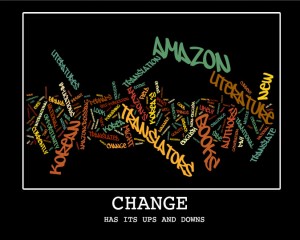It’s a brand new translating ballgame (via Wall Street Journal Online). Amazon.com Inc. plans to create a publishing house, called AmazonCrossing, that will translate foreign books into English. Amazon will acquire the rights to foreign books and have them translated in-house. These books will be printed and sold through traditional channels; national and independent booksellers as well as third party wholesalers, but they will also be available through the Kindle e-bookstore, which opens up an entirely new market.
Amazon’s announcement has implications for translators and implications for national literatures of non-English countries.
For current translators, the future might be quite different. If Amazon opens the floodgates here, there would likely be a far greater demand for translators (who are currently ‘demanded’ primarily by Korean governmental institutions), but at whatever Amazon’s rates are. The article notes that, “An Amazon spokesman declined to say how much the company will pay its translators.” If I had to translate that into an estimate of pay, I’d say pay would be lower than is traditional. This raises a secondary question, which has implications for National literatures as well, as to what the standards will be. In terms of translation, the main question will concern quality – who will guard quality, and will there be enough good translators available? Time, I suppose, will determine the answers there.
On the positive side, the current translation field for Korean literature is dominated by a handful of well-known translators, and this might open the field up for a new generation of translators suitable for the new generation of Korean literature. Current translators have a good handle on pundan munhak, which they churn out with astonishing regularity, but it might be time for a change on that front.
For National literatures, like Korea’s, this is an opportunity and challenge. The opportunity is obvious: More books will be translated. The challenge is to assure that these books are read. My guess is that this new move will make “brand marketing” of a non-English literature (By which I mean Korean!) even more critical. If Hong Gildong/John Doe is given the choice between two books on AmazonCrossing, it is likely he will go to the literature with which he is familiar. Genre authors have been making money on the recognition of this preference for familiarity, for as long as publishing has existed. This means that Korea’s existing efforts at branding, both nationally and specifically for literature, will take on added importance. The kind of work currently being done at Korea’s Nation Branding Committee, for instance, will be increasingly key.
Amazon might do some National literatures, and I hope Korea’s, a service with their new imprint. That service will be a function of a standard to which Amazon assiduously hews. Amazon’s eye is tightly focused on profit and it is unlikely they will translate works that Amazon thinks will end up on some dusty shelf in a Korea Studies Program library. Amazon will likely look for authors who fit with potential English readers, perhaps younger authors with more contemporary and/or international outlooks such as Park Min-kyou or Kim Young-ha. Or perhaps Amazon will look for more traditional authors like Park Wan-suh who write stories of universal appeal.
But what they certainly will look for authors of books that sell. This should free translation of Korean literature from some of the binding and chafing it currently suffers in its ongoing attempt to translate literature that is culturally representative (in Korean eyes), rather than intriguing (to English reading eyes).
There has to be an old Korean saying about change bringing both opportunities and threats, and this change certainly brings both. The complete dimensions of Amazon’s program are still unclear, and perhaps it will be something that Korea will have no direct impact on. But to the extent that Korea successfully builds its brand overseas? That is the extent to which Korea will be able to take advantage of this new avenue for translation.
Finally, two other things occur to me (as soon as I post this, 13 other things will – because that’s the way!^^)
1) I wonder if Amazon will accept books that have already been translated/are offered to them translated, or if that is better left to the self-publication side of Amazon? The article notes that Amazon does scour its self-publication side with its imprint AmazonEncore, which searches for and publishes successful self-published books “officially.” Still, if Amazon does have a “side-door,” so to speak, through which titles can be introduced to AmazonCrossing, that would represent a great opportunity.
2) If Google jumps in on this, which would not surprise me in the least (unless this is somehow a patentable idea), this will become, as we say, ubiquitous. At that point, any literature that does not try to maximize its impact in the field will be committing a kind of international suicide.




